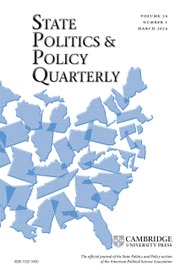We thank William Berry, Richard Fording, and Justin Crofoot for their ongoing interest in and attention to our efforts to generate direct measures of state policy mood (Enns and Koch Reference Enns and Koch2013; Reference Enns and Koch2015; Lagodny et al. Reference Lagodny, Jones, Koch and Enns2023). We also appreciate their encouragement to scholars to reflect on our measures as well as those developed by Caughey and Warshaw (Reference Caughey and Warshaw2018).
To help researchers continue to understand and develop measures of state public opinion, we have recently archived a harmonized “mega poll” of more than 1.1 million survey responses from 1948 to 2020 and corresponding codebook and documentation with the Roper Center for Public Opinion Research (Enns and Lagodny Reference Enns and Lagodny2023; Lagodny and Enns Reference Lagodny and Enns2023). We have used these data to estimate state public opinion in our past research and we hope the data will allow scholars to further evaluate and improve upon our measures of state public opinion and our previous election analyses and forecasts (Enns and Lagodny Reference Enns and Lagodny2021; Enns, Lagodny, and Schuldt Reference Enns, Lagodny and Schuldt2017). In addition to making the data available, the documentation highlights shifting demographic and political patterns in the U.S. as well as increasing variance across surveys for several demographic categories. We have also included instructions in the documentation for how scholars can contribute additional data to this mega poll and receive citation for their efforts. We look forward to utilizing and citing research that builds upon and improves on our past work.
Funding statement
The authors received no financial support for the research, authorship, and/or publication of this article.
Competing interest
The authors declared no potential competing interests with respect to the research, authorship, and/or publication of this article.
Author Biographies
Peter K. Enns is a professor in the Department of Government and the Brooks School of Public Policy and the Robert S. Harrison Director of the Cornell Center for Social Sciences at Cornell University. He is also a co-founder and chief data scientist at Verasight.
Rebekah Jones is a PhD Candidate in Political Science at the University of California, Berkeley. Her primary research examines the political economy of crime policy.
Julianna Koch is a Senior Research Director at Buzzback Market Research.
Julius Lagodny is the main Data Analyst at El Pato, a Berlin-based media company, and a Research Fellow at the Data Lab of the Hertie School.


